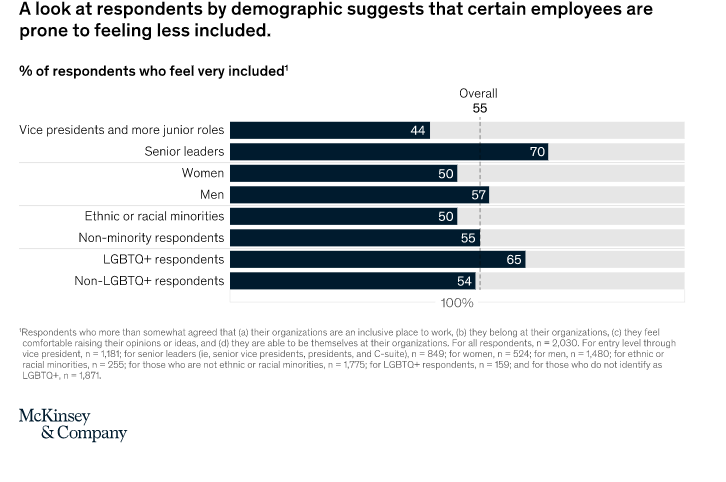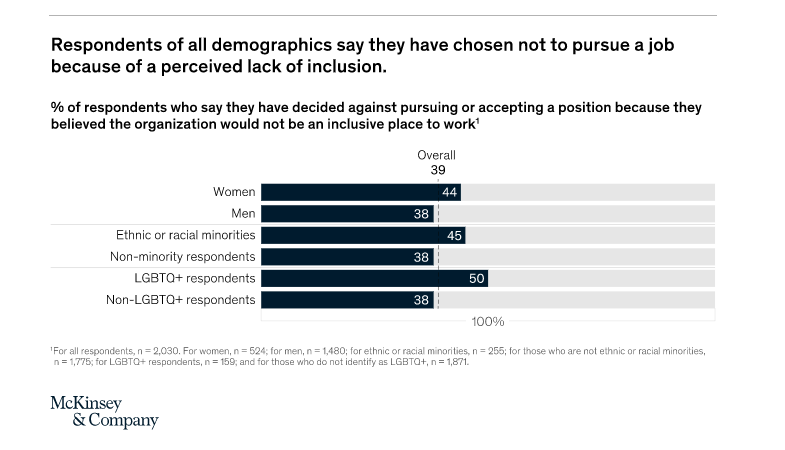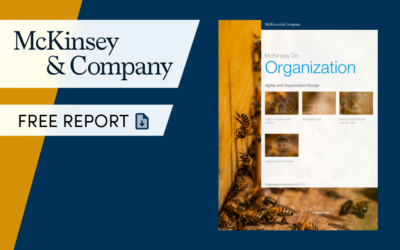Research recap for a McKinsey & Company study: “Survey results show that many employees do not feel fully included at work and want their organizations to do more to advance inclusion and diversity.”
Inclusion is defined by McKinsey & Company as the degree to which an individual feels that their authentic selves are welcomed at work, enabling them to contribute in a meaningful and deliberate manner.
“Our survey research finds that respondents of all backgrounds encounter barriers to feeling included—and that women, respondents who are ethnic and racial minorities, and those who identify as LGBTQ+ encounter additional challenges.”
The guts of this research by McKinsey & Company, as our own data has also shown from our clients here at Swae (you can see more on that here), tells us that organizations that make inclusivity a priority can increase innovation, look at and change old ways of thinking (that no longer add value), and improve financial performance.
People that feel included in their organizations are three times more likely than their peers to feel excited by and committed to their organizations.
Imagine having a bunch of people working at an organization that feel truly excited and committed! By creating a more inclusive culture, this is how organizations can build teams where there is more trust, and better (and deeper) collaboration. From this point, this is when things can change, and more positive gains can be seen.
There are new generations of workers that are becoming the majority who want to know and feel that they add value, want to be included, and diversity does matter.
There are some common barriers that this study found as to why employees from a diverse set of companies don’t feel inclusion.

1. There are some types of employees that automatically feel less included than others based on their role.

2. There’s a disconnect between the individual capabilities that employees value most and their perception of which capabilities matter most to their organizations.
3. Too many workplace microaggressions happen on a regular basis, which are everyday slights rooted in bias. In every subgroup—by gender, gender identity, minority status, or sexual orientation—more than eight in ten respondents report these indignities.
More Knowledge, Less Time
The Two Minute Takeaway
On the other hand, there are companies that are doing inclusion right! These were 4 of the common threads that this research found of the companies doing it right (this is how your leadership team can start creating a more inclusive culture within your company):
KEY TAKEAWAY 1
KEY TAKEAWAY 2
Build in meritocracy and develop initiatives to increase fairness in performance evaluations: A meritocratic company culture is strongly associated with a sense of inclusion, as are initiatives that increase fairness in performance evaluations.
KEY TAKEAWAY 3
Provide career advancement sponsorship: If colleagues go out of their way to create professional-advancement opportunities for people, then a strong sense of inclusion is felt.
KEY TAKEAWAY 4
Why This Matters
Inclusivity, diversity, meritocracy… all of these things matter because data shows time and time again that companies lose when they don’t put any real effort behind these things. In fact, not making inclusion a priority means companies lose out on top talent to-boot.
“Thirty-nine percent of all respondents say they have turned down or decided not to pursue a job because of a perceived lack of inclusion at an organization.”
39% turned down or decided not to pursue a job because of a perceived lack of inclusion

In this time of uncertainty, companies can win and potentially create a much more successful path if their priorities are shifted to focus on their people.
These are some of the simple shifts that a company can make starting today:
- Include all employees in conversations around these efforts that surround creating an inclusive culture.
- Build teams that represent this (diverse and inclusive), and it starts with leadership.
- Change behaviors to be more inclusive. Demonstrate inclusivity through actions rather than words.
Summary and Next Steps
People that feel included in their organizations are three times more likely than their peers to feel excited by and committed to their organizations. There are some common organizational barriers that hinder inclusivity, as there are also common ways to do it right.
And the bottom line is that the new generations of workers that are becoming the majority want to add value, be included, and they want to see diversity in the leadership and teams because it matters to them. If people see themselves reflected in others, they can be more at ease being who they truly are (this is where the word authentic comes into the equation).
What organizational barriers can you see in your organization that hinders inclusivity?
Does leadership (or do you) put real actions and efforts into creating a more inclusive environment within your company? If so, how?

Swae is helping organizations across the world to solve today’s problems and generate tomorrow’s strategy. Our clients are finding that their greatest resource is their people, and Swae is proven to help get the best from the untapped potential within their workforce. We’d love the chance to show you how Swae can ‘pay off’ for you…

Ready to learn how Swae can help your organization?
More to explore…
Agility and Organization Design | McKinsey
Agility and Organization DesignMcKinsey on OrganisationSUMMARY “Coming together is a beginning; keeping togetheris progress; working together is success.” Henry Ford What makes an organization successful?A successful organization is like a colony of bees – a...
The Helix Organization | A McKinsey Report
The helix organizationMcKinsey QuarterlySUMMARYSeparating people-leadership tasks from day-to-day business leadership can help organizations strike a better balance between centralization and decentralization, reduce complexity, and embrace agility. "As our business...




Can you be more specific about the content of your article? After reading it, I still have some doubts. Hope you can help me.
Your article helped me a lot, is there any more related content? Thanks!
Your article helped me a lot, is there any more related content? Thanks!
Can you be more specific about the content of your article? After reading it, I still have some doubts. Hope you can help me.
Your point of view caught my eye and was very interesting. Thanks. I have a question for you. https://accounts.binance.com/sl/register-person?ref=W0BCQMF1
sizde uygun fiyatlardan heets satin alin.
At the beginning, I was still puzzled. Since I read your article, I have been very impressed. It has provided a lot of innovative ideas for my thesis related to gate.io. Thank u. But I still have some doubts, can you help me? Thanks.
I don’t think the title of your article matches the content lol. Just kidding, mainly because I had some doubts after reading the article.
I may need your help. I tried many ways but couldn’t solve it, but after reading your article, I think you have a way to help me. I’m looking forward for your reply. Thanks.
The point of view of your article has taught me a lot, and I already know how to improve the paper on gate.oi, thank you. https://www.gate.io/zh-tw/signup/XwNAU
Your blog has helped me discover new perspectives and challenge my own beliefs. I appreciate the open and respectful dialogue you foster through your thought-provoking articles. Thank you for promoting healthy discussions.
Your article gave me a lot of inspiration, I hope you can explain your point of view in more detail, because I have some doubts, thank you.
Your blog is a gratitude sanctuary, offering solace and comfort in the embrace of thankfulness. Thank you for the refuge!
Your article helped me a lot, is there any more related content? Thanks!
Thanks for sharing. I read many of your blog posts, cool, your blog is very good.
Can you be more specific about the content of your article? After reading it, I still have some doubts. Hope you can help me.
Your point of view caught my eye and was very interesting. Thanks. I have a question for you.
Thank you for your sharing. I am worried that I lack creative ideas. It is your article that makes me full of hope. Thank you. But, I have a question, can you help me?
I don’t think the title of your article matches the content lol. Just kidding, mainly because I had some doubts after reading the article.